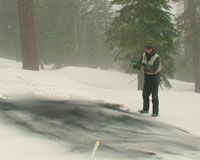Snowy, Sandy Research Explores Climate Change
06 Sep 2012
News Source: UC Merced University News
From the white, sugary sands of Hawaii to the white, powdery slopes of the Sierra Nevada, Natural Sciences Professor Stephen Hart has his eye on climate change.
For the past two years, the professor, who’s affiliated with the Sierra Nevada Research Institute, has worked with student researchers at remote sites in the mountains. They manipulate the snowpack to see the effects of early snowmelt on the forest, from how it affects the nutrients in the soil and plant growth, to how greenhouse gases are emitted from the soil.
It’s all with the goal of designing better predictive tools, and they’ve gotten some surprising results.
Although Hart thought they’d find that the earlier the snowmelt, the more carbon dioxide would be released from the microorganisms in the soil – contributing to even more global warming –it appears to be just the opposite.
“The emissions are actually slowed down,” Hart said.
Read more from the UC Merced University News.
Media contact & author: Lorena Anderson
Senior Public Information Representative
T: 209-228-4406
News Source:
READ MORE from UC Merced University News >>
News Category:
RESEARCH |
PUBLICATIONS |
PEOPLE
Publications
2014
Snowmelt timing alters shallow but not deep soil moisture in the Sierra Nevada . Blankinship, J.C., Meadows, M.W., Lucas, R.G., and Hart, S.C. (2014): Water Resources Research.
Explore Further

